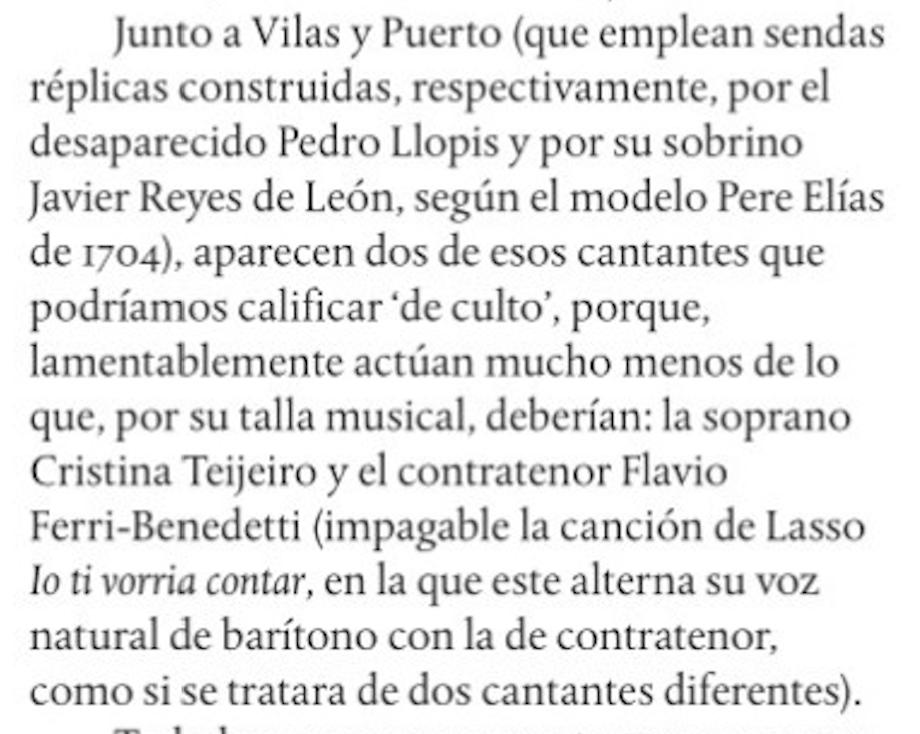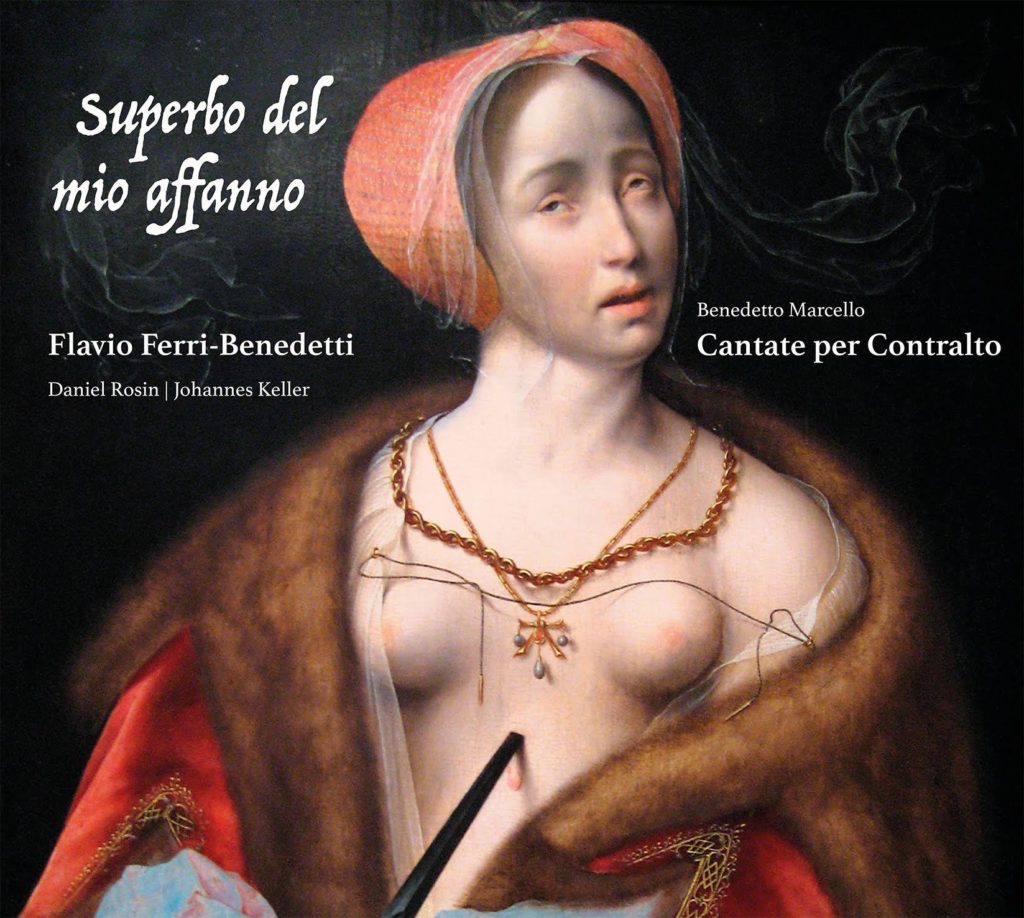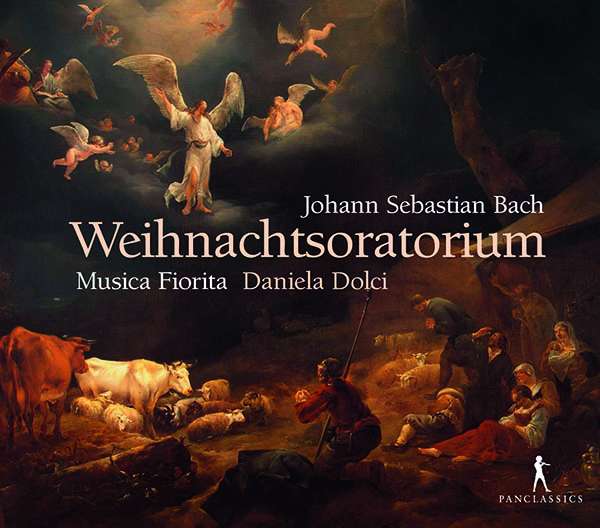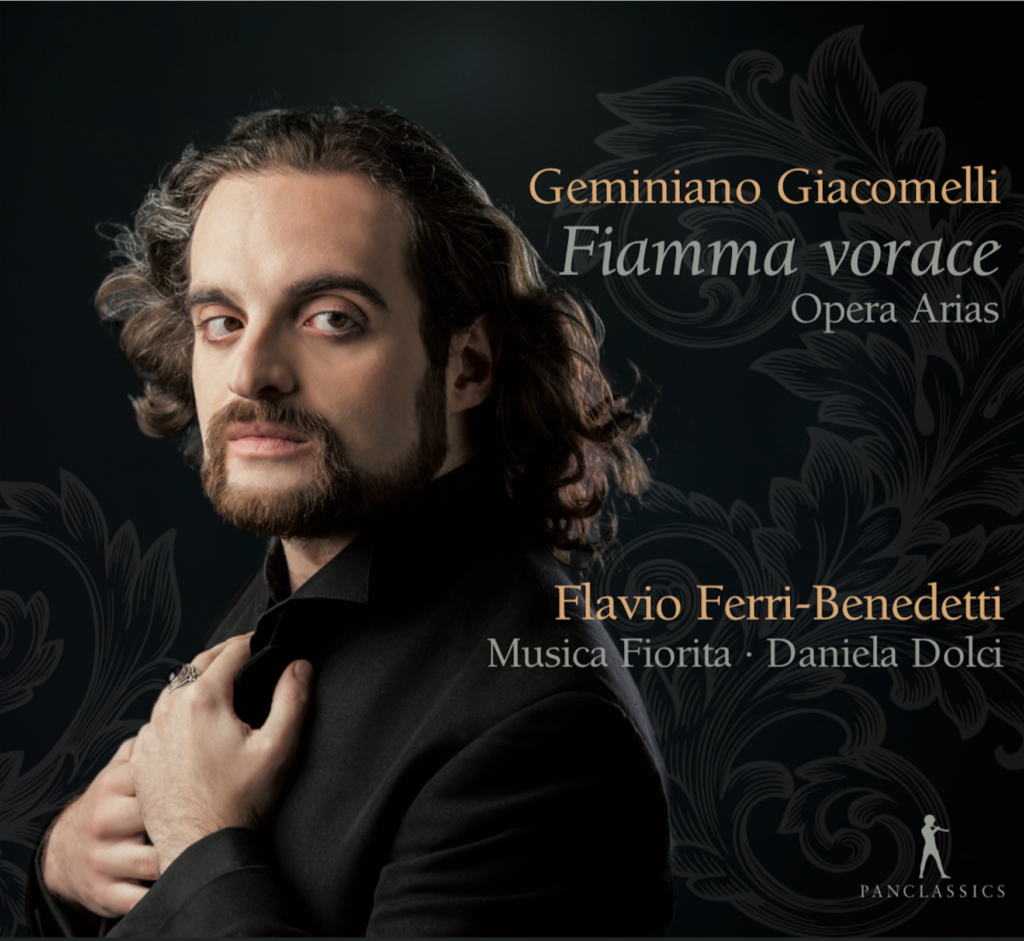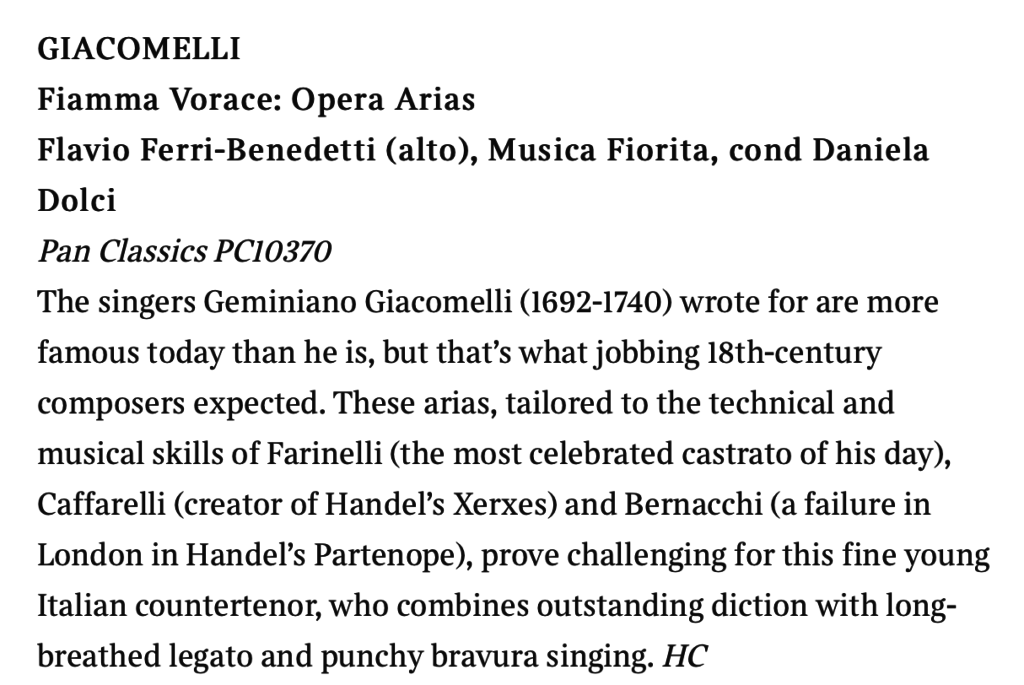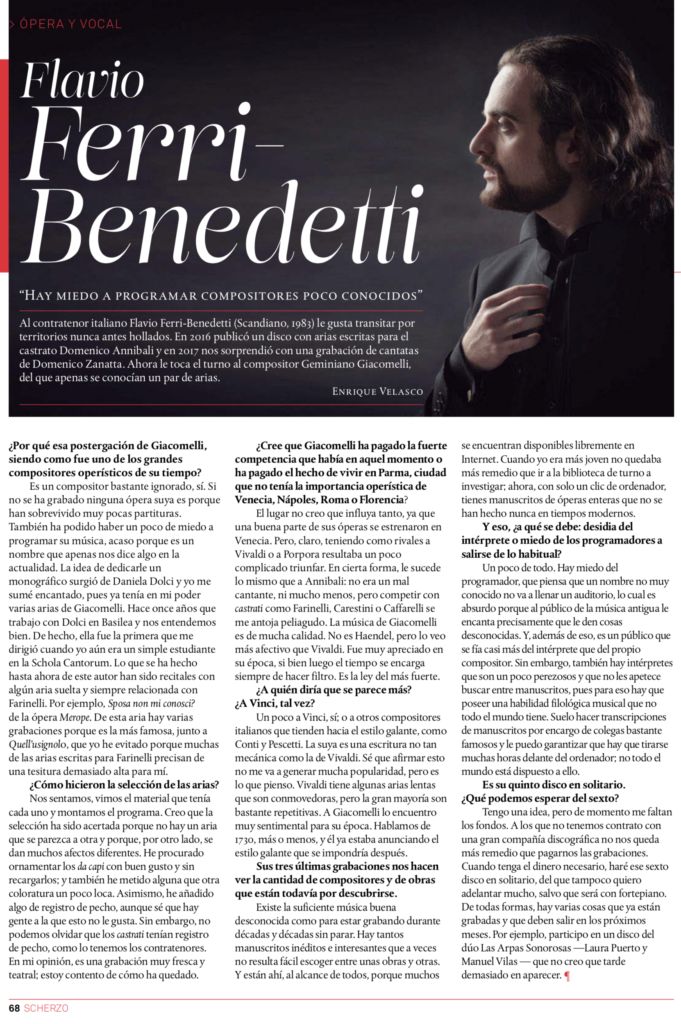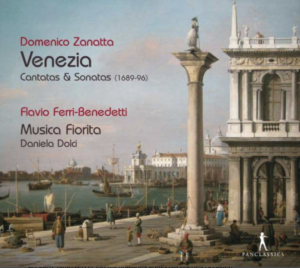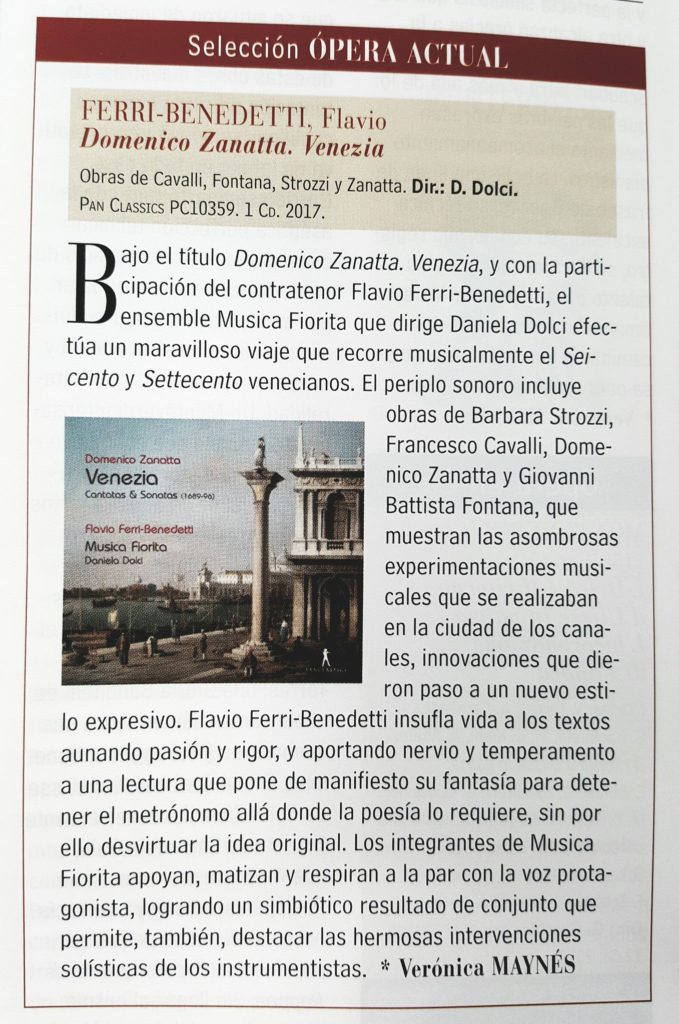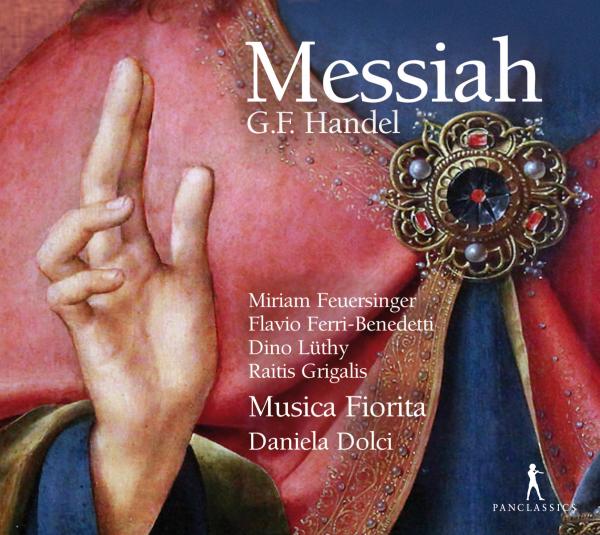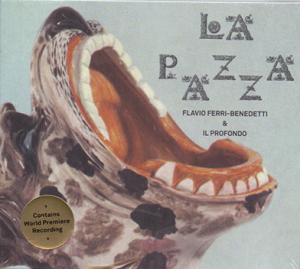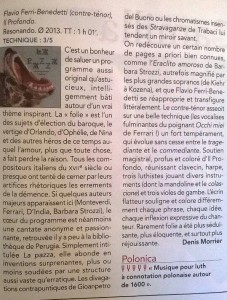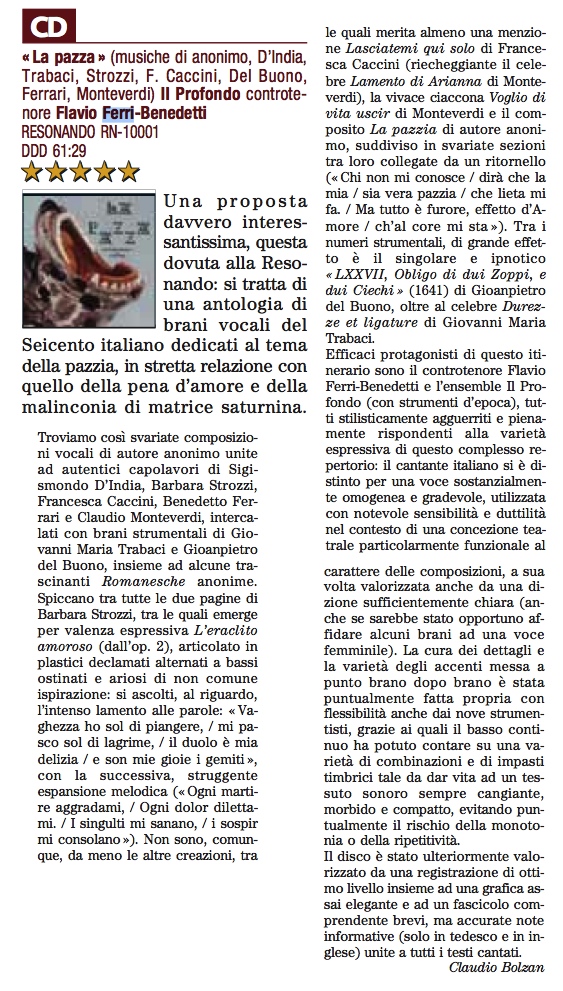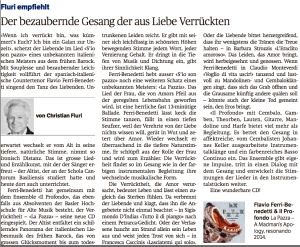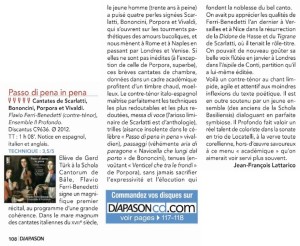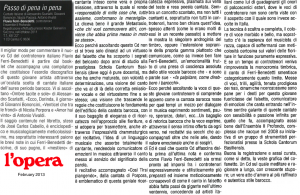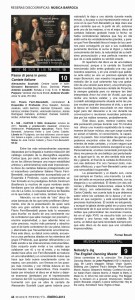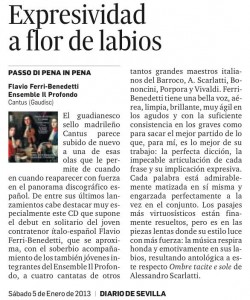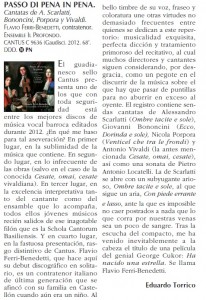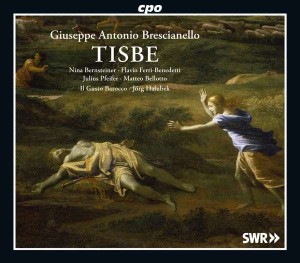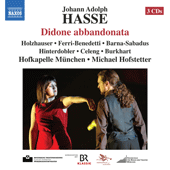Discography Reviews
Tañendo con voz sonora
(Scherzo, 2023)
Superbo del mio affanno (Marcello)
Marcello parece poner mayor énfasis tanto en la prosodia como en los aspectos retóricos de los textos puestos en música. Justamente es ese el terreno en el que el contratenor nacido en Italia, pero criado en Castellón y formado en España, destaca de forma especial: los detalles de fraseo, la dicción, el respeto de la prosodia y la pronunciación, los matices sobre palabras concretas que cargan de sentido a toda la obra. Por supuesto que eso no es suficiente, porque la escritura es de un gran virtuosismo, pero es ese refinamiento en el decir el que da el toque de distinción a sus interpretaciones, que además apuestan por el más clásico de los acompañamientos en el continuo: un clave y un violonchelo. Sin alharacas pero con hondura.
(Diario de Sevilla)
Ferri-Benedetti’s projection of the words is exemplary and all six cantatas become mini-dramas in his vivid performances. Lovers of English falsettists might find his baritone low notes controversial, but they are undeniably exciting.
(The Guardian)
Flavio Ferri-Benedetti has several recordings of Italian cantatas to his credit, and these were all very convincing. That is the case here as well. Notable is that at several moments he turns to his chest register for the lowest notes, and that is quite effective, for instance in passages about hell. His ornamentation is extensive and stylish, and the recitatives are sung in true declamatory style, as they should.
(Musica Dei Donum)
Ferri-Benedetti se enfrenta a estas cantatas […] con la voz en un casi provocativo primer plano, […] volcando con fuerza todo el sentimiento dramático que encierran, fraseando con elegancia y hondura, luciendo su vibrante y carnosa zona media vocal y bajando con naturalidad al registro baritonal. No es música fácil, desde luego, pero Ferri-Benedetti la borda.
(Scherzo)
Man konzentriert sich automatisch auf den Gesang. Und es lohnt sich Flavio Ferri-Benedetti bei seinen Interpretationen genau zuzuhören, denn er singt mit einem angenehm unprätentiösen Stil und scheinbar ganz in der Musik aufgehend. Es wundert nicht, dass er 2009 und 2010 jeweils als Nachwuchskünstler des Jahres im Opernwelt?Jahrbuch nominiert wurde. Es macht einfach Spaß, seiner Stimme zu lauschen. Dennoch sollte man Daniel Rosin und Johannes Keller nicht vergessen, denn ihre Begleitung ist passend und unterstützt den Sänger bestens.
(Musik An Sich)
Questo nuovo cd del controtenore italiano Flavio Ferri-Benedetti, ora docente di canto barocco alla Università delle Arti di Zurigo e vocal coach alla gloriosa Schola Cantorum Basiliensis oltre che cantante giunto al culmine della sua maturità, offre una scelta di sei bellissime cantate, le prime cinque in prima incisione assoluta: “Ah, ch’io sento in lontananza”, “Arresta, arresta il piè”, “Cresci col pianto mio”, “Cantan lieti ne’ boschetti”, “Qual mai fato inumano”, “La Lucrezia”.
Ferri-Benedetti non ha nulla da invidiare ai colleghi italiani che oggi più di lui si ascoltano sui palcoscenici contribuendo a far guadagnare alla scuola italiana una posizione di eccellenza che prima era appannaggio quasi esclusivo di falsettisti di area anglosassone e francese. Lo si ammira per la voce timbricamente bella, calda, intensa e insieme setosa, nel segno dell’eleganza, mai soggetta a compiaciuta sovreccitazione ritmica nel canto melismatico o a uno svaporato abbandono in quello patetico, soprattutto pronta a piegarsi a un arcobaleno di tinte e sfumature che sfociano in arditezze belcantistiche possibili grazie alla solida tecnica. La dizione è accuratissima, addirittura ricercata in recitativi davvero miniati, l’intonazione perfetta (qualità non così scontata fra i falsettisti) e l’utilizzo dei vari registri mostra una vocalità che ad arte spazia dalle sonorità di testa a quelle di petto con il giusto mélange espressivo, sempre al servizio della parola.
Accompagnato dal clavicembalista Johannes Keller e dal violoncellista Daniel Rosin, entrambi bravissimi, la voce di Ferri-Benedetti si vota in senso totalizzante a sentimenti di dolore, rabbia, vendetta e tormento che fanno parte di amanti abbandonati o offesi, oggetto delle pagine incise. Nella cantata “Qual mai fato inumano” troviamo un innamorato che preferirebbe naufragare in una tempesta di sospiri piuttosto che sentirsi dimenticato dal suo bene. Qui, nel malinconico arioso “Cara, nel dirti addio”, Ferri-Benedetti sfoggia un calore avvolgente nell’esprimere l’idea di un affetto spezzato, di un cuore infranto colpito da un abbandono che si fa carico di sospiri equilibratamente divisi fra languore e densità di suono, declinati al massimo dei risultati nella magnifica messa di voce che si ascolta nel da capo; un canto concentrato sul dolore con toccante patetismo. Nella sezione finale della cantata poi, “Tuoni il ciel e s’apra il mar”, non una sola cadenza bensì l’aria stessa è scritta su due ottave, dal fa grave del contralto al fa acuto, quindi davvero impervia, eppure Ferri-Benedetti vince una sfida tanto complessa da vero virtuoso, utilizzando il canto come espressione sonora delle figure retoriche suggerite dalle parole.
Si capisce che sia un virtuoso anche ascoltando la parte conclusiva della prima cantata, quando in “Mora l’infido” la gioia nell’immaginare la morte del traditore come risoluzione di vendetta si esprime con drammatici salti anche di un nono magistralmente risolti, con un controllo dell’emissione e un dominio fra i diversi registri, dall’acuto al grave, di grande effetto.
Passiamo alla seconda cantata del cd, “Arresta, arresta il piè”, dove l’anima dell’amante tradita cerca vendetta e chiede una spada e una face per metterla in atto per poi capire che sarà nel cerchio infernale dei traditori, “tra le turbe degli estinti”, a trovare soddisfazione. Qui a sorprendere è la cadenza che conclude la terza sezione, dove la voce di Ferri-Benedetti realizza un vero prodigio: un salto di tre ottave che porta la voce dal la acuto al la grave, tutta in un fiato, con scala e arpeggi discendenti.
Il capolavoro di questa raccolta è la cantata dedicata a Lucrezia. Benedetto Marcello ne scrisse due pensando alla donna romana come simbolo di virtù, pronta all’estremo gesto del suicidio dopo essere stata vittima della violenza di Tarquinio il Superbo, ultimo dei sette re di Roma. Composta dal compositore sullo stesso testo dell’omonima cantata di Händel, inizia con un recitativo, “O numi eterni, o stelle”, che esprime rabbia e sdegno; segue l’aria “Già superbo del mio affanno” nella quale, dinanzi alla donna attonita per la violenza subita, quasi si coglie lo sguardo di Lucrezia perso nel vuoto, pervaso di infinita tristezza, fino a quando si arriva, sulle parole “parte l’empio, lo sleal”, ad ascoltare un nota emessa in piano e d’un sol fiato, intonata da Ferri-Benedetti con dolcezza quasi ipnotica, così da evocare quello che si racconta fossero le note filate dei cantori evirati. Nel presto finale, il breve arioso “Nell’inferno farò la mia vendetta”, Lucrezia prima di spirare lancia i suoi strali e conclude la pagina con una lunga nota tenuta che si interrompe d’improvviso sulla morte dell’eroina.
Questi e altri ricami ancora si colgono in un canto che è riflesso di cultura vocale intrisa di conoscenza stilistica del canto barocco in tutte le sue coniugazioni belcantistiche, tali da fare di Ferri-Benedetti un poeta e un abile giocoliere del falsetto, capace di essere così eloquente proprio perché sa utilizzare il belcanto a fini emozionali oltre che vocali, mettendolo al servizio della parola, proprio come voleva Benedetto Marcello, convinto assertore che musica e canto dovessero prima di tutto esaltare i valori espressivi del testo. Ancora una volta, dopo tanti cd passati – si citino quello dedicato alle cantate italiane di autori diversi, un altro al castrato Domenico Annibali e infine alle arie d’opera di Geminiano Giacomelli – Flavio Ferri-Benedetti si conferma, con questa nuova registrazione, uno dei più sensibili, colti e preparati italici profeti del falsetto di oggi, fra tutti forse il più ricercato sul piano virtuosistico.
(Connessi all’Opera – Alessandro Mormile)
***
Weihnachtsoratorium (Bach)
With Musica Fiorita (Dir. Daniela Dolci) – PAN CLASSICS
“The alto, Flavio Ferri-Benedetti, stunning in ‘Schlafe, mein Liebster’…”
(EarlyMusicReview.com, December 2018)
Fiamma vorace (Giacomelli)
With Musica Fiorita (Dir. Daniela Dolci) – PAN CLASSICS
(The Sunday Times, 18th March 2018)
**
**
“Der Altus Flavio Ferri-Benedetti versteht es mit seinem sinnlichen Stimmklang und grandios ausgeformten Koloraturen, diesen einzelnen Charakteren aus den Werken (Merope, Lucio Papirio Dittatore, Adriano in Siria, Cesare in Egitto) dieses phantastischen Komponisten, leben einzuhauchen. Eine musikalische Vielfalt und eine ausgeklügelte Kompositionstechnik machen diese CD zu einem besonderen Erlebnis. Angereichert wird diese CD durch kurze sinfonische Stücke aus den Werken (Gianguir, Merope, Adriano in Siria und Cesare in Egitto) Die Musica Fiorita unter der Leitung von Daniela Dolci zaubern einen herausragenden Klangteppich. Eine CD die von der ersten bis zur letzten Sekunde begeistert.”
(Ihr Opernratgeber blog – March 2018)
**
“E” de EXCEPCIONAL – REVISTA SCHERZO (Madrid)
Mayo de 2018
“El contratenor italiano (afincado en Castellón desde hace más de veinte años y formado en Basilea), ya con cinco discos como protagonista, va consolidando poco a poco, sin prisa pero sin pausa, una de las más loables carreras de entre los de su cuerda, aunque sin el aparato propagandístico del que se han sabido rodear algunos de sus colegas. Hay pocos contratenores que posean la técnica de Ferri-Benedetti (brillantísimos agudos y un prodigioso cambio del registro de cabeza a la voz modal). […] Disco absolutamente imprescindible.”
***
Ferri-Benedetti has edited some of the material himself and supplies scholarly yet engaging booklet notes […] Ferri-Benedetti possesses an agile alto and an appealing, sweet-sounding mezza voce […] His coloratura is effective here with its pinprick staccatos. […] ‘Mancare, oh Dio, mi sento’ from Adriano in Siria is a graceful siciliana, finely negotiated and elegantly phrased.
Gramophone May 2018
***
“Mancare, oh Dio, mi sento is the finest aria on the CD […] admirably suited to the considerable talents of Flavio Ferri-Benedetti, a singer not only gifted with a voice of considerable beauty, but also of a musical intelligence that allows him to capture with perfect sense both the musical and literary syntax of the aria’s agonized opening lines. He is excellent too in three fine arias from Merope […] The singer displays a good technique, with cleanly articulated passaggi and nicely turned ornaments.”
Opera (UK) June 2018
***
“Ferri-Benedetti sings with studied attention and crisp precision in realising the pristine beauty of Giacomelli’s writing, be it the chromatic turns of ‘Spera, si, presago in petto’ which looks ahead to the Rococo style of the operas of Haydn or early Mozart, or the long, sustained lines of ‘Sposa, non mi conosci?’.
…he tends to project the music with a similar steady, mezzo-forte articulation throughout the programme, and controls the timbre and tonal quality of his singing, except to emphasise certain upward leaps in the melody with an audible swoop to create somewhat sensational points of interest, as in ‘Torbido nembo freme’. He achieves a broadly consistent, smooth, almost disembodied quality of tone, and evinces a marginal sense of contrast by infusing his singing with a modicum more emotion at times, for example through the more private, incisive manner of delivery in ‘Mancare, oh Dio, mi sento’ which paradoxically attains a greater intensity as a result, or the more nasal, urgent tone adopted both for that aria’s repeated section, and ‘Sposa, non mi conosci?’.
The listener misses, perhaps, a more dramatic dimension to these extracts, despite the ambient acoustic of the recording, and it is true that they are best appreciated in a handful at a time, rather than at one sitting, despite interspersed sinfonias from the same operas, as well as from Gianguir. But Ferri-Benedetti’s artistry is subtle and one should expect to be taken here into the more private world of the characters originally created by the likes of Farinelli, Bernacchi, and Antonio Baldi, rather than confront the more extrovert virtuosity often required by such singers.
In any case, the spirited playing by Musica Fiorita under Daniela Dolci’s direction offers more colour and exuberance, not only in the sinfonias which avail themselves of a Vivaldian vigour, but also in the supporting role they play in the arias, where they instil a robust energy in the disc’s title aria ‘Fiamma vorace’, and cultivate the pompous, stately character of ‘Saggio guerriero antico’ and ‘Alla fastosa, superba’ Roma for example.
Giacomelli has received sporadic attention on disc elsewhere, such as by Ann Hallenberg and Vivica Genaux in other contexts, but this is a welcome opportunity to assess his work on its own terms, which is attractive enough and sympathetically espoused by Ferri-Benedetti here. The latter also provides informative notes about the works in the accompanying booklet. The release whets the appetite for a complete recording of an opera by Giacomelli.”
MUSICWEB-INTERNATIONAL (May 2018)
******************************************************************
Venezia (Zanatta-Cavalli-Strozzi)
with Musica Fiorita (Dir. Daniela Dolci) – PAN CLASSICS
SELECCIÓN DE “ÓPERA ACTUAL” (Mayo 2017)
**
“El contratenor Flavio Ferri-Benedetti se muestra en todo momento sereno, contenido, fino y elegante, lo que le permite la más sutil traducción de la música. Expresivo y exquisito por momentos, muestra buena coloratura y control dinámico.”
(Scherzo, diciembre de 2017)
************************************
Messiah (Handel)
with Musica Fiorita (Dir. Daniela Dolci) – PAN CLASSICS
“Momentos verdaderamente memorables; por ejemplo, el aria He was despised, cantada por Ferri-Benedetti como jamás antes se la había escuchado cantar a nadie (hombre o mujer). Muy a lo Alfred Deller. Me atrevería a decir que esta aria por sí sola es argumento lo suficientemente sólido como para adquirir el álbum.”
SCHERZO (Feb 2017)
“El contratenor Flavio Ferri-Benedetti nos aporta alguno de los mejores momentos vocales, con una He was despised de extraordinaria expresividad, colmada de magníficos detalles y con un gran manejo del cambio de registro (una de las notas más destacables de su interpretación es justamente el abundante empleo del registro de pecho).”
EL ARTE DE LA FUGA (Nov 2016)
“Flavio Ferri-Benedetti, dem Rezensenten bislang nicht bekannt – eine kaum verzeihliche Nachlässigkeit, wie das Studium diverser Quellen leicht zu zeigen geeignet war –, ist eine echte Entdeckung, setzt mit seinen Beiträgen ein vokales Glanzlicht der Produktion: Er singt lyrisch makellos, agiert technisch beeindruckend, ist gesegnet mit einer stupenden dramatischen Autorität – bietet mithin alles, was seine vor allem im ersten Teil des Messias raumgreifende Partie verlangt.”
KLASSIK MAGAZIN (Dez 2016)
“Flavio Ferri-Benedetti is so much better in ‘He was despised’ […] he really explores the depth of this aria with his differentiated interpretation.”
Musica Dei Donum (Apr 2019)
***
Si no os hubiera mirado (Juan Vásquez)
with Los Afectos Diversos (Dir. Nacho Rodríguez) – ITINERANT CLASSICS
“E” de EXCEPCIONAL – SCHERZO
“En la voz célica de Flavio Ferri-Benedetti y la sensual vihuela de Manuel Minguillón constituyen unos de los más irresistibles encantos de esta gema discográfica.”
SINFONIA VIRTUAL – Febrero de 2018
“la luminosa voz de Flavio Ferri-Benedetti (alto)” — “destaca poderosamente la impresionante voz del ya citado Flavio Ferri-Benedetti. Nuestro solista masculino acomete la nada fácil tarea de interpretar en este magnífico arreglo, esencialmente, la voz (especialmente aguda) del Tiple (original),por lo que se hace necesario estar en posesión de una buena técnica vocal y un excelente dominio del registro agudo o de falsete –como es el caso de Flavio– y, por consiguiente, ser capaz de emitir limpiamente las notas más agudas, haciendo uso –que no abuso- de un timbre filado y muy liviano cuando así se requiere, mostrando un dominio de la técnica en ese registro agudo que pudiera recordar a lo que leemos de los antiguos castrados” — “las cualidades vocales del gran contratenor Flavio Ferri-Benedetti, y en especial al uso que éste hace del citado timbre filado” — “A las cualidades del solista, señaladas ya en el párrafo anterior, cabría añadir la ausencia absoluta de nasalizaciones indebidas, una dicción clara y limpia, su estupenda utilización de los resonadores craneales y un timbre rico en matices –el color vocal-. — “
Flavio nos ofrece una clase magistral de canto en las repeticiones, donde añade algunos ornamentos y ligeros trémolos, sin aspavientos, que enriquecen la interpretación.
La versión de Enríquez de Valderrábano aquí propuesta tampoco es desdeñable, ya que presenta una difícil y rica escritura en el registro agudo, que incluye adornos y algunos giros, obligando al solista a hacer un notable uso del registro agudo o de falsete, bien timbrado. Aquí se hace aún más patente que en casos anteriores la gran importancia de contar con un buen fiato y una emisión segura -requisitos que reúne Flavio-, dada la gran cantidad de notas mantenidas y de largos fraseos.
También debemos señalar que, a tenor de lo escuchado en este vibrante CD, este cantante masculino –muy en particular- ha comprendido a la perfección la importancia capital de la capacidad expresiva en la música de Vásquez. Precisamente para enfatizar ciertas palabras del texto y reforzar las diversas emociones subyacentes a la música, Flavio Ferri-Benedetti aporta gran cantidad de matices estéticos (ornamentos) y dinámicos en todas sus interpretaciones e, indudablemente, logra emocionar al oyente.”
**
MELÓMANO DE ORO y “R” de RITMO
***
Arias for Domenico Annibali
The Dresden Star Castrato – PAN CLASSICS
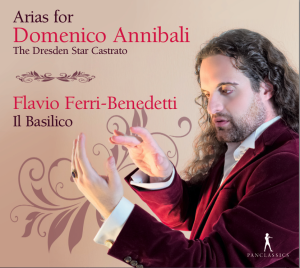
“E” de SCHERZO (España) — DISCO EXCEPCIONAL!
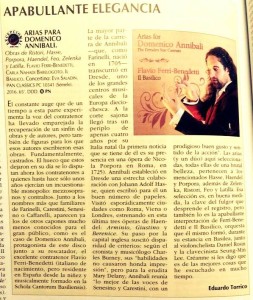
“The excellent countertenor FFB – born Italian but raised in Spain since a child and an alumnus of the Schola Cantorum Basiliensis — all chosen arias (and the duet) are brutally beautiful – with the astonishing performance by FFB and Il Basilico, baroque ensemble he created in Basel together with Daniel Rosin (Cello) and Seung Min Lee (Cembalo) — believe me if I tell you this is one of the best things I have heard in a long time!” — April 2016
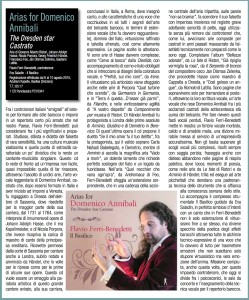
<<Among the Italian countertenors who have “emigrated” to study baroque singing and try to succeed in a repertoire that is more loved abroad than in Italy, Flavio Ferri-Benedetti can be counted among the most significative and well-prepared. Well-read, interested in matters of style and a cultivator of falsetto-singing who is gifted with a rare sensitiveness, he has a very wide musical culture and that pinch of character brilliance, a bit divo, that makes him a special singer-musician. […] “Vado a morir” from Arminio, which requires perfect breath support and an outstanding legato. In the aria from Feo’s “Andromaca”, Ferri-Benedetti shows a surprising range, making his falsetto descend, in one of the cadenze, into chest voice with imperious insolence. […] Flavio Ferri-Benedetti shows a soft, warm timbre, gifted with affable charme, an admirable diction put to the service of a very accurate expressiveness. He not only can sing the most complex passages, always resolved with wise know-how, but he also phrases with great abandon in the pathetic arias, where he touches moments of real poetry, like in Ristori’s “Le Fate”, or Handel’s “Arminio” – he trills and performs state-of-the-art staccati, showing his domain of the technique and the sovereign knowledge of the style. Il Basilico, guided by Eva Saladin, in perfect symbiosis with Ferri-Benedetti’s singing, which is not a mere expression of per-se virtuosism, but becomes a mirror for baroque affetti and their poetics, through the technical-expressive alchemy of a voice that really makes all it can in order to instill emotions which do not cause mere virtuosic surprise but real soul feelings. Mission accomplished, also this time, for this fearless countertenor who, nowadays, is divided between stage, concert halls and teaching.>>
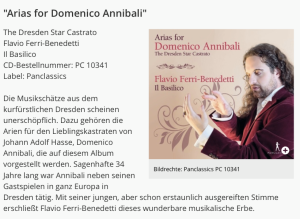
MDR KULTUR
“Mit seiner jungen, aber schon erstaunlich ausgereiften Stimme erschließt Flavio Ferri-Benedetti dieses wunderbare musikalische Erbe.”
“With his young but astonishingly matured voice, Flavio Ferri-Benedetti opens up with wonderful musical heritage (of Domenico Annibali)”
L’APE MUSICALE:
“Per parafrasare Aristofane, si potrebbe anche per Ferri-Benedetti usare l’epiteto “bocca di miele”, come il commediografo l’usò per Sofocle: questa voce naturalmente melliflua, calda, eppur robusta nei bassi, vibrante, è argilla madida per l’interprete, che la plasma di volta in volta a seconda dell’effetto che vuole rendere.”
“«Bellezze adorate», dove il controtenore dà soprattutto prova sublime del suo raffinato fraseggio, della florida pienezza delle sue note centrali, mostrandoci magistrale resa della tradizionale figura barocca dell’amante languente. … «A vostro dispetto», dove Ferri-Benedetti sciorina tutto il suo virtuosismo, fatto di impeccabili fioriture. … «Cervo al bosco» Ferri-Benedetti staglia egregiamente tutti i suoi talenti: trilli, fioriture, salti, quanto di più raffinato mandasse in visibilio il pubblico dell’epoca (e quello d’oggi). Di Hasse Ferri-Benedetti canta anche l’aria di Niceforo dall’Irene,«Perfidi, sul mio core», in cui ci mostra una fibra nerboruta in grado di sorreggere un canto che spesso tocca le vette più alte come pure lambisce la compagine dei bassi. … «D’esser già parmi», ancora un’aria d’amore, dove le calde ornamentazioni (eseguite con tecnica facile e spigliata) descrivono lo struggimento amoroso con una metafora arborea – la voce di Ferri-Benedetti, inoltre, si sposa particolarmente bene con l’orchestrazione argentina e contrastata scelta da Porpora.
Dalla Berenice Ferri-Benedetti interpreta un duetto («Se il mio amor fu delitto») con la brava Carla Nahadi Babelegoto: le loro voci si sposano deliziosamente nelle proiezioni delle varie e articolate ornamentazioni. Dall’Andromaca di Francesco Feo il controtenore italiano interpreta l’aria dello sfortunato Astianatte, «Quel nocchier che vana ogn’opra», di un cristallino virtuosismo verticale che descrive la disperazione di Astianatte: da notare l’impressionante discesa a note praticamente tenorili nel massimo della tensione drammatica, fatto che dimostra la tecnica smagliante di Ferri-Benedetti.
«Così geloso un angue», ancora brillantemente virtuosistica (brevi messe di voce, fulminei portamenti, fioriture ad libitum). Eva Saladin dirige un’eccellente ensemble, il Basilico (peraltro co-fondato dal Ferri-Benedetti), che dà prova di un impareggiabile gusto per l’esecuzione della scrittura d’accompagnamento vocale d’epoca barocca.
Un CD certamente di grande valore, non solo per la presenza di rarissime gemme del sempre ricco Barocco altrimenti difficilmente ascoltabili, ma anche per l’interpretazione elegante, colta, raffinata, di Flavio Ferri-Benedetti.”
EARLY MUSIC REVIEW:
“Flavio Ferri-Benedetti gives us a good taste of Annibali’s great artistry. He is at his mellifluous best in the slower pieces – try the opening Ristori ‘Belleze Adorate’, or Handel’s stately ‘Vado ad Morire’ (track 4) with its continuo-accompanied opening, the band being held back until the music moves to the dominant, creating a remarkable sense of spaciousness. He is joined in further Handel (from Berenice) by Carla Nahadi Babelegoto’s graceful soprano. In the faster and especially the more dramatically urgent pieces, he displays remarkable agility, though his tone becomes a little harder; from time to time his breathing between phrases has also been rather closely miked for comfort. For me, the most enjoyable track was the last one, from G. A. Ristori’s Componiment per musica, with its extended accompagnato (note the lovely pastoral drones) and firecracker of an aria.
Throughout, Il Basilico play like angels – there is a jaw-dropping display of solo horn (Olivier Picon) and solo theorbo (Ori Hannelin) in Hasse’s ‘Cervo al Bosco’ from Cleofide, and the strings produce tremendous dash and attack under Eva Saladin’s excellent leadership.”
GRAMOPHONE (UK)
Domenico Annibali (c1705-c1779) was employed at the Dresden court opera from 1730 until his retirement in 1764 – but from time to time he was given leave of absence to appear in Rome (in 1732 and 1739) and London (1736 37). Eleven arias from his repertoire are explored in a cleverly varied recital by Flavio Ferri-Benedetti (an alumnus of the Schola Cantorum in Basel) that helps us to see the bigger picture.
The graceful ‘Bellezze adorate’ from Ristori’s Le fate(Dresden, 1736) is sung with eloquent tastefulness, whereas Alexander the Great’s ‘Cervo al bosco’ from Hasse’s Cleofide (Dresden, 1731) has florid singing that is both precise and shaded poetically – and Olivier Picon’s brilliant horn obbligato and Ori Harmelin’s nimble theorbo flourishes are reminders that the Dresden court orchestra was without equal in Europe. Il Basilico’s strings are virile in the title-role’s flamboyant description of a furious whirlwind in Porpora’s Germanico in Germania (Rome, 1732), which is contrasted immediately with Handel’s sublime depiction of Arminio’s tender farewell to his beloved as he anticipates his execution by Roman invaders (‘Vado a morir’); Ferri-Benedetti’s softly emotive messa di voceand elegant embellishments are delightful.
Less immediately convincing is some extravagant ornamentation descending deep into the baritone register in Feo’s ‘Quel nocchier che vana ogn’opra’ from Andromaca (Rome, 1730). The concluding set-piece ‘A vostro dispetto’ from Ristori’s Componimento per musica (Warsaw, 1736) is a thrilling tour de force – although the cadenza finishes up the octave in a manner that I personally find a bit clumsy (others may find it energetic). Nevertheless, this diligent exploration of mostly unfamiliar music is an auspicious debut from these talented performers.
DIAPASON (FR)
“FFB’s voice is of enough size not to get lost in the clothes of this castrato —- Ristori’s first aria reveals a comfortable middle register, good not only for mystery but also for vehemence. He shows similar virtues in the splendid “Vado a morir” from Arminio. Also virtuosity is no problem for our countertenor, judging from the expert articulation of the coloraturas in RIstori’s “A vostro dispetto”: such dexterity on the repeated notes, such reflexes in the joining of melodies on the go!
We hope FFB will be able to conquer us with his next program, better fit for his undeniable talent.”
FANFARE (USA)
“As for the performances themselves, countertenor Flavio Ferri-Benedetti performs this sometimes dizzying series with accuracy and feeling. His intonation is very good, and the voice has a nice depth that one finds appealing in this repertory. Whether doing the tortuous roulades of the often dangerous coloratura or gently flowing along with more lyrical lines, his interpretations are nicely done. Add to this the secure and sensitive playing of the Il Basilico period instrument group and one has a fine disc that would do Annibali proud. Now, if only we could get the recordings of complete operas in context, we would have an excellent foundation for the opera seria of the time.”
EL PAÍS (Cultura) (Oct 2016)
“No sabemos ni sabremos cómo cantaba Annibali más allá de sus afinidades estilísticas, su registro, su versatilidad de “caníbal”, su reputación documentada, pero Ferri-Benedetti se atreve a “invocarlo” en una grabación de gran belleza y sensibilidad. Tanto impresionan los pasajes pirotécnicos como lo hacen los momentos de quietud. Y predomina un ejercicio de intuición musical y de exhuberancia que convierten al contratenor italiano en el médium de una sesión de espiritismo.”
MUSICA DEI DONUM (web, Mar 2018)
…The “whirlwind” is effectively depicted by the coloratura, brilliantly sung by Flavio Ferri-Benedetti. He also does very well in the fiery aria ‘Perfidi, sul mio core’ from Hasse’s Irene and in ‘A vostro dispetto’ from Ristori’s serenata Componimento per musica. … Ferri-Benedetti is a natural opera singer. He is in particular better suited to stuff like rage arias where the singer needs to have a really theatrical personality. Ferri-Benedetti has that, and that comes off very well here.
*****
LA PAZZA – Second solo recital!
 CINQ DIAPASONS!
CINQ DIAPASONS!
“Un programme aussi original qu’astucieux… un certain nombre de pages […] que Flavio Ferri-Benedetti se réapproprie et transfigure littéralement. Le contre-ténor asseoit sur un belle technique (les vocalises fulminantes de Ferrari!) un fort tempérament, qui évolue sans cesse entre le tragediante et le commediante. Soutien magistral, profus et coloré d’Il Profondo… Rarement folie a été plus séduisante, plus éloquente, et surtout plus réjouissante.”
“An original, clever program… a certain number of pieces […] reconquered and literally transfigured by Flavio Ferri-Benedetti. The countertenor owns a good technique (e.g. the fulminating vocalisations in Ferrari!), a strong temperament which evolves non-stop between tragic and comic. Il Profondo supports magistrally, richly and with many colours… Rarely madness has been as seducing, eloquent and rejoicing as it is here.”
Diapason Sept 2015
CINQUE STELLE on RIVISTA “MUSICA” – ITALY!
February 2015
“Really interesting concept” […] “The effective protagonists of this itinerary are the countertenor Flavio Ferri-Benedetti and the Ensemble Il Profondo (on period instruments), all stylistically passionate and fully responsive to the variety of expressions present in this complex repertoire: the Italian singer stands out for his substantially smooth and pleasant voice, used with great sensitivity and flexibility in the context of a theatrical conception, particularly effective with regards to the character of the pieces. This also enhanced by a sufficiently clear diction […] The attention to detail and the variety of accents song after song was duly endorsed by the nine instrumentalists, thanks to which the bass line was able to rely on a variety of combinations and mixtures of timbre, thus creating an ever-changing sound texture, soft and compact, avoiding the risk of monotony or repetitiveness. “
MUSICA – Febbraio 2015
*****
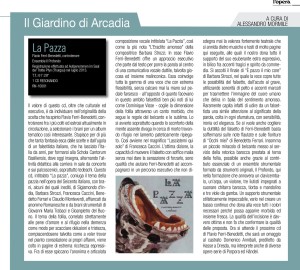
A LITTLE MIRACLE OF BELCANTO…
“One of the most well-read and skilled countertenors working nowadays … FFB’s performance approach starts from the text – the word is at the centre of the communication – sometimes fluent, sometimes joyous, sometimes melancholic. The whole range of his voice is involved – never as a farce – and approaches madness with flexible singing —- great diction and the ability to move his falsetto with flexible charm, never giving the impression of forcing …. always between tragic accents and comedy …. Rarely it happens to find a countertenor with such attention to the meaning of the words, painted in all nuances, sensitiveness, irony, elegance .. A LITTLE MIRACLE OF BELCANTO AT THE SERVICE OF BAROQUE RHETORICS …. Instrumental support is impeccable and varied, with a basso continuo that gives all necessary colours so that the music can appear flexible and fresh…”
L’OPERA – Milano – Febbraio 2016
*****
“Los artífices de tan exquisito recital son el contratenor italo-español Flavio Ferri-Benedetti, formado en la Schola Cantorum Basiliensis y con una fulgurante carrera actualmente. Diría que estamos, probablemente, ante su mejor registro como protagonista. Su línea de canto destila elegancia, el timbre es realmente hermoso, muy homogéneo y delicado. Su canto es fluido, incluso nos regala algunos momentos con su voz «natural» de barítono. El agudo está bien asentado, y se muestra muy preparado en el ámbito dramático, como es habitual en él. Ferri-Benedetti es un gran cantante, pero también un gran actor, capaz de meterse muy dentro de los personajes que encarna. Además, su dominio de los idiomas –no solo como cantante, sino como Doctor en Lenguas y Literaturas que es– hace que su acercamiento siempre tenga un plus de conocimiento y rigor, del que se aprende mucho. Es, por lo demás, un cantante realmente expresivo, muy dotado para la escena, tanto por su vis cómica, como por su faceta más trágica, de lo que da buenas muestras en este recital –de ambas–. Encarna en la actualidad, sin duda, uno de los mejores ejemplos del cantante completo, aquel que aúna todas las facetas más importantes para conseguir expresar con su voz y su presencia.”
Codalario.com – Junio 2015
*****
“El contratenor castellonenc d’origen italià… Flavio Ferri-Benedetti no solament interpreta amb una gran elegància sinó que també investiga el repertori del segle XVII. I escoltant aquest disc, ens adonem que és un músic de sòlid ofici i d’un talent indiscutible. Les seves interpretacions ho corroboren.”
“The Italian-born countertenor from Castellón… FFB not only interprets with great elegance but also researches and edits the repertoire of the 17th century. Hearing the CD, one can notice he is a solidly formed musician and has indisputable talent. His interpretations confirm this.”
Sonograma.com – Julio 2015
*****
“Alejando un tanto del desmedido y a veces esperpéntico oropel que acompaña a los grandes divos del actual star-system contratenoril, la carrera profesional de Ferri-Benedetti se levanta sobre los cimientos del rigor musical, del rigor musicológico (adquiridos ambos en sus años de aprendizaje en la Schola Cantorum Basiliensis), del buen gusto y de la modestia, algo esto último que empieza a ser una virtud escasa en algunos de sus colegas. Sin embargo, nadie que haya seguido de cerca su trayectoria podrá negarle el mérito de estar en ese selecto ramillete de contratenores que han normalizado, primero, y dignificado, después, esta cuerda canora, reducida hasta hace no mucho tiempo y no en pocos casos a un puro morbo, a algo parecido a una exhibición de feria tipo Freaks.
El disco es un maravilloso elogio a la locura por parte de Ferri-Benedetti, no sólo a la hora de cantar, que lo hace de manera sublime, sino también a la hora de seleccionar las obras. Le acompañan sus compañeros (y, sin embargo, amigos) de la época de Basilea, agrupados en el Ensemble Il Profondo, que, como su propio nombre indica, están especializados en los instrumentos propios del bajo continuo: viola de gamba, violone, contrabajo, tiorba, archilaúd, guitarra barroca, colachón, arpa y, por supuesto, clave. Se incluye también una insólita mandolina barroca, que dicho sea de paso posee un sonido increíble. Entre canto y canto a la locura, Il Profondo incluye varias piezas instrumentales de Giovanni Maria Trabacci y alguna romanesca anónima para clave, ejecutada extraordinariamente por Johannes Keller.”
EL ARTE DE LA FUGA – Eduardo Torrico – Diciembre de 2014
***
“Vielleicht könnte man Ferri-Benedetti als Charakter-Counter bezeichnen. Zwar verfügt er über betörend verströmende, glockenklare Töne, neigt mitunter aber zu einer gewissen Schärfe, die er freilich meist geschickt in seine Interpretation einzubauen weiß.” “die besondere Gabe Ferri-Benedettis: nämlich zu charakterisieren, einen Text in all seinen Facetten in musikalische Gesten zu übersetzen. Wer den Counter einmal auf der Bühne erlebt hat, z. B. in Basel oder Frankfurt, konnte sich von seinem umwerfenden komödiantischen Talent überzeugen .”
“Maybe one could define FFB as ‘Character-Counter’. He owns crystal-clear, beguilingly exuding notes, but tends sometimes to a certain sharpness that he freely and consciously mixes in his interpretations. The special gift of FFB is to characterize, to translate in musical gestures a text in all its facets. Anyone who has experienced him once on stage, like in Basel or Frankfurt, could enjoy his stunning comic talent.”
SWR Germany
***
“Mit Souplesse und bezaubernder Leichtigkeit vollführt der spanisch-italienische Countertenor FFB singend den Tanz des Liebenden. Unerwartet wechselt er vom Alt in seine tiefere, natürliche Stimme, nimmt so ironisch Distanz. Das ist grosse Lied- und Erzählkunst, mit der der Sänger erfreut (der Altist, der an der Schola studiert hatte…) […] Er gibt mit seiner sich leichtfüssig in schönsten Höhen bewegenden Stimme jedem Wort, jeder Verzierung Gehalt. Er dringt in die Tiefen von Musik und Dichtung ein, gibt ihrer Sinnlichtkeit Klang. […] Ferri-Benedetti lässt keck die Stimme tanzen, fällt in einen tiefen Seufzer… wieder wechselt er überraschend in die tiefere Naturstimme. Er schlüpft aus der Rolle der Frau und wird zum Erzähler.”
“With subtlety and charming ease the Spanish-Italian countertenor FFB performs the dance of the lover. Unexpectedly he changes from alto to his natural, deep voice, thus taking ironic distance. This is great art of singing and narrating, with which the singer delights (an alto who had studied at the Schola…) […] He gives a value to every word and every ornament with his voice, light-flowing to the beautiful high notes. He penetrates the depths of music and poetry and gives sound to their sensuality. […] Ferri-Benedetti lets the voice dance cheekily, falls into deep pain… then surprisingly changes again to the natural low voice… he slips out of the woman role and becomes a narrator.”
BZ – 24 Jan 2015
***********************
“Suggestives Theater für das Ohren…”
CD DEBUT “Passo di pena in pena…” (with Ensemble Il Profondo)
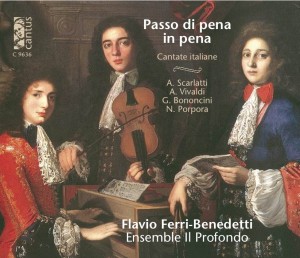
CANTUS RECORDS @ 2012
“Magnífico despliegue de belleza y honestidad”
[Fantastic display of beauty and integrity]
CODALARIO.COM – August 2013
*************************************************
 CINQ DIAPASONS!
CINQ DIAPASONS!
“”Magnificient first recital, with a program of great coherence […] warm, soft timbre […] The italo-spanish countertenor masters perfectly the most formidable and feared techniques: messa di voce (the Scarlatti arioso is anthological), trilli (with insolent ease in the Vivaldi), passaggi (in the aggressive “Navicella” of Bononcini), legato (in the Porpora), never sacrificing the expressiveness and the elocution, founding elements of belcanto’s nobility. […] Here is a pure-singing countertenor, agile and attentive to the smallest inflections of the poetic text.”
DIAPASON AVRIL 2014
*************************************************
FIVE STARS! CINQUE STELLE! RIVISTA “MUSICA” (Italia) – March 2013
“Flavio Ferri-Benedetti, controtenore iberico di origini emiliane qui alla sua prima incisione da solista, non è una sorpresa totale per chi lo avesse già udito dal vivo in alcuni piccoli ruoli operistici, ma si può ben definire una rivelazione […] questo allievo di Gerd Türk possiede un organo brillante e rotondo nei passi di agilità, appassionato nei movimenti lenti, elegante con un pizzico d’ironia dove serve per sottolineare l’enfasi improbabile di certi luoghi comuni d’Arcadia. Soprattutto, controllando il fiato come comandano i Santi Padri del Bel Canto, riesce ad articolare il fraseggio in base alla semantica del testo.”
“Flavio Ferri-Benedetti, Iberian countertenor born in the Aemilia (Italy), makes here his solo debut CD – not a surprise for those who have already seen him in small operatic roles, but one can say he is a revelation. […] This student of Gerd Türk owns a bright and round instrument in the coloratura, passion in the slow movements, elegance with a pinch of irony where some Arcadian clichés have to be underlined… Especially thanks to his control of the fiato how the Holy Fathers of Belcanto prescribe, he is able to articulate the phrasing according to the meaning of the text.”
*************************************************
L’OPERA (Milano) Febbraio 2013
[…] it is interesting how F. F. B. himself describes the “job” of a singer as if it were a “mission” […] A vision of the singer who does not only care about correct vocal emission and virtuosism per se […] but also tries to express a meaning also through the dramatic expressiveness of the recitativo, the idea of a musical language that totally absorbs the singer, turning him into a “communicator” of emotions put into music, while the act of singing is at the service of the words’ meaning.
[…] What Ferri-Benedetti well does, he communicates with such emotion as is the result of an absolute knowledge of the baroque vocal style […] This is why this CD fascinates the listener from beginning to end, confirming F. F. B. ready to be counted among the most expressively and stylistically prepared countertenors nowadays […] His technique is secure and complete, his timbre is pleasant and beautiful, but what is more important, he has the wisdom that only belongs to real musicians, capable of taking meticulously care of each embellishment’s meaning, purely expressively. And, if once countertenors were accused of monochromatic timbre, Ferri-Benedetti’s singing is a proof of the opposite: messe di voce, trills, coloratura, prodigious fiato, exquisite dynamics… it is all in the hands of this young extraordinary falsettist: a communicator of emotions who does not just sing, but also enters carefully the galant feeling of these cantatas with infinite love and passion for what he does, very well accompanied by Ensemble Il Profondo, a group formed in 2008 by instrumentalists who studied together at the Schola Cantorum Basiliensis. The recording is good and the format is very tasteful. This is a CD on which one can meditate and think for a long time, with ever-growing surprise: a true act of love for the purest and most authentic baroque style.
[…] interessanti mi sembrano le brevi note in cui Ferri-Benedetti descrive di suo pugno il “mestiere” di cantante inteso come vera e propria missione […] Una visione del canto che va al di là della corretta emissione vocale e del virtuosismo fine e se stesso […] e si adopera per trasmettere, anche attraverso l’espressività drammaturgica del recitativo, l’idea di un linguaggio musicale che assorbe totalmente il cantante, rendendolo comunicatore di emozioni in musica attraverso il canto messo al servizio del significato della parola.
[…] come sa ben fare Ferri-Benedetti, comunicare un’emozionalità che è frutto di una presa di coscienza assoluta delle stile vocale barocco […] Ecco perché questo cd affascina dalla prima all’ultima nota e conferma come Flavio Ferri-Benedetti sia ormai pronto per imporsi fra i controtenori più espressivamente e stilisticamente preparati […] La tecnica è scaltra e completa, il colore di voce morbido e bello, ma soprattutto c’è la sapienza del musicista di razza, capace di soffermarsi con meticolosità certosina sui valori delle fioriture in funzione puramente espressiva. E se un tempo ai controtenori veniva rimproverata la monocromia timbrica, il canto di Ferri-Benedetti smentisce categoricamente questo limite. Messe di voci, trilli, agilità, tenuta prodigiosa dei fiati, dinamiche ricercatissime sono pane per i denti per questo giovane fuoriclasse del falsetto, comunicatore di emozioni che canta non tanto per farlo, ma entra con il microscopio nell’intimo sentire galante di queste cantate con amore e passione infinite per quello che fa, accompagnato assai bene dall’Ensemble Il Profondo, complesso che nacque nel 2008 su iniziativa di un gruppo di strumentisti che studiavano alla Schola Cantorum Basiliensis. Buona la registrazione e veste grafica del cofanetto assai curata. Un cd sul quale meditare e ragionare a lungo, con crescente stupore; un vero atto d’amore al più puro e autentico stile barocco.
*************************************************
“De timbre ajustado, poderoso y elegante, se muestra tremendamente seguro en los pasajes más ornamentados -fabuloso en los da capo-, pero fascinante sobre todo en las arias lentas, en las que nos ofrece su mejor faceta. El texto es paladeado en cada sílaba, consiguiendo una dicción extremadamente límpida y todo un ejemplo de cómo debe cantarse el italiano -su formación en lenguas aflora aquí en su máximo esplendor. La línea de canto es fluida, cómoda, natural -en un contratenor es esencial […] Destaca, sobre todo, la gran expresividad de la que hace gala el italiano, mostrando una empatía brutal con cada palabra del texto que interpreta.”
[With a close-fitting, powerful and elegant timbre, he shows extreme security in the most ornamented passages – fabulous da capi – but he is especially fascinating in the slow arias, where he is at his best. The text is savoured in each syllable, obtaining an extremely clear diction and an example of how Italian has to be sung: his linguistic background is clearly evident. The singing line flows comfortably and naturally – which is essential in a countertenor […] It is to highlight the great expressiveness that the Italian singer shows, with a brutal empathy on each word of the interpreted texts.]
CODALARIO.COM *** Agosto 2013
*************************************************
“La voz de Flavio Ferri-Benedetti que, con su perfecta dicción y su impecable articulación, permite acercarnos a la lírica singular que ofrece esta colección de cantatas profanas editadas por Cantus Records… Este conmovedor álbum… No sólo el matiz de las palabras, Ferri-Benedetti canta con pasión y sentimiento, sino también del fraseo musical del conjunto Ensemble il Profondo… Ferri-Benedetti las embellece y las adorna con naturalidad, sin forzar el color ni los afectos.”
[Flavio Ferri-Benedetti who, with his perfect diction and impeccable articulation, lets us approach the peculiar poetry featured in these secular cantatas… moving album… It is not only word-colouring: FFB sings with passion and feeling – and Il Profondo’s musical phrasing… FFB adorns these cantatas in a natural way, without forcing either colour nor affects…]
Sonograma Magazine – April 2013
http://www.sonograma.org/suplement-de-discos/passo-di-pena-in-pena/
*************************************************
MUSIK UND THEATER (CH) – April 2013
“Mit Liebesschmerz in allen Schattierungen stellt sich der Altus Flavio Ferri-Benedetti auf seiner ersten CD vor […] FFB setzt die Musik (der Kantaten) ausdrucksvoll um. Der dreissigjährige Italiener, Absolvent der Schola Cantorum Basiliensis, besitzt eine sicher geführte, individuell gefärbte Stimme mit leichter, leuchtender Höhe, einer substanz- und farbenrichern Mittellage, aber auch einem markanten Registerbruch in der Tiefe […] Er singt nicht nur sauber und stilsicher, er verfügt auch über eine reiche Palette an gestalterischen Nuancen, die er klug einsetzt. […] Schimmernde Geigen-Linien […] Wie etwa Sänger und Musiker zu Beginn der Scarlatti-Kantate die Schrecken der Nacht hörbar machen, ist suggestives Theater für die Ohren.”
(English): “Countertenor Flavio Ferri-Benedetti presents himself on his first CD with love’s pain in all its shades […] FFB performs the music expressively. The 30-year old Italian, Schola Cantorum graduate, owns a secure voice with an individual colour, light, shining high register, substantial and colour-rich middle register but also a striking break in the low register […] He sings not only clean and stylistically sure, but also employing a rich palette of artistic nuances, which he applies cleverly. […] Shimmering violin-lines […] The way the singer and the musicians translate into sounds the dread of the night is suggestive theatre for the ears.”
*************************************************
Review of “Passo di pena in pena” Magazine “Música Perfecta” (Spain)
Excerpts in English:
Mark: 10 (Interpretation: 10 / Sound: 8 Libretto: 10 / Presentation: 10)
Among the most extraordinary surprises offered by the complete catalogue of the Spanish label Cantus […] we find this impressive recording of Italian cantatas sung by the magnificent Italian countertenor Flavio Ferri-Benedetti, beautifully accompanied by Ensemble Il Profondo, whose members have studied at the prestigious Schola Cantorum Basiliensis […]
Watch out: this is not “yet another” album of baroque arias, like many nowadays. It is the presentation of FFB, who will be soon a big star of early music. FFB has everything in order to succeed: a consistent countertenor voice which he can use with precision and huge expressivity, and, moreover, has a beautiful colour, so much more personal and attractive than that of many other countertenors who have a flat, white, effeminate voice. For this CD, his debut as a soloist, FFB has perfect allies in the Ensemble Il Profondo, very refined and with a beautiful sound in the instrumental moments. This Ensemble usually invites the soloists they want to work with, not the other way around: their work for years with Ferri-Benedetti translates into a natural feeling and a mutual knowledge that makes everything sound exactly as expected: with precision, firmness in the quick passages and endless sweetness in the melancholic moments. As an example, play the first track of the CD and let yourself fall in love (be enraptured): the prodigious instrumental introduction to the Scarlatti cantata is performed in an amazing way – followed by an impressive messa di voce with which FFB underlines the great singer that he is. From here on, we are facing one of the best, if not the best album of Italian cantatas recorded to this day: there haven’t been Italian countertenors among the “big ones”, and it seems like Ferri-Benedetti goes the right way to become it: he has not only the technical quality, but also the logical and natural knowledge of the text, the naturalness of his most beautiful diction and the perfect way with which he gives the exact meaning to each word. […] This album deserves our highest mark: for almost 70 minutes we get a splendid example of the best way to make music: the way that appears when talent, knowledge, capacity and passion come together. It contains endless gems. My personal favourite is the beginning of the CD, of an almost disturbing beauty – but also the final aria of the Bononcini cantata […] sung by FFB with an unsurpassable sensuality. […] As usual with Cantus, presentation and design are marvellous […] the libretto by José Carlos Cabello tells us everything we need to know about the cantatas and their context. The sound is beautiful […] with very good clarity and strength. […] In short, it is a debut that will be remembered forever, because this album is one of those that receives the adjective of: “essential”.
*************************************************
“El protagonista canoro de este CD es el contratenor Flavio Ferri-Benedetti, que también en reflexiona en el texto de la carpetilla sobre la fenomenología del canto como arte de mediar, conmover, enfurecer, purificar, sentir y hacerse sentir. Su voz trasluce refinamiento, exquisitez y sensualidad, mediante un timbre muy agradable, una dinámica segura y un fiato que no admite la más mínima fisura. El solvente, eficaz e inspirado acompañamiento corre a cargo del Ensemble Il Profondo, ocho antiguos alumnos de la Schola Cantorum Basilensis especializados en música barroca.”
[The singing protagonist of this CD is countertenor Flavio Ferri-Benedetti, who also writes in the libretto his reflections about the phenomenology of singing as the art of linking, moving, enraging, purifying, feeling and being felt. His voice is full of refinement, exquisiteness and sensuality through a very pleasant timbre, secure dynamics and a perfect fiato. The efficient and inspired accompaniment is performed by Ensemble Il Profondo, composed by eight ex students of the Schola Cantorum Basiliensis, specialized in baroque music.]
SINFONIAVIRTUAL.COM [January 2013]
*************************************************
“El debut en solitario del joven contratenor ítalo-español Flavio Ferri-Benedetti, que se aproxima, con el soberbio acompañamiento de los también jóvenes integrantes del Ensemble Il Profondo, a cuatro cantatas de otros tantos grandes maestros italianos del Barroco […] Ferri-Benedetti tiene una bella voz, aérea, limpia, brillante, muy ágil en los agudos y con la suficiente consistencia en los graves como para sacar el mejor partido de lo que, para mí, es lo mejor de su trabajo: la perfecta dicción, la impecable articulación de cada frase y su implicación expresiva. Cada palabra está admirablemente matizada en sí misma y engarzada perfectamente a la vez en el conjunto. Los pasajes más virtuosísticos están finamente resueltos, pero es en las piezas lentas donde su estilo luce con más fuerza: la música respira honda y emotivamente en sus labios, resultando antológica a este respecto Ombre tacite e sole de Alessandro Scarlatti.”
[The solo debut of the young Italo-Spanish countertenor Flavio F. B. who performs, together with the excellent accompaniment of the young Ensemble Il Profondo, four cantatas of four great masters of the Italian Baroque […] Ferri-Benedetti has a beautiful, aerial, clean, brilliant voice, very agile in the high register and with enough consistency in the low register – all in order to make the most out of the best feature of his singing, in my opinion: the perfect diction, the impeccable articulation of each phrase and its expressive implication. Each word is splendidly nuanced in itself and also perfectly merged into the ensemble. The most virtuosic passages work well, but it is in the slow pieces where his style shines more evidently: the music breathes deeply and emotionally in his lips. Thus, Ombre tacite e sole by Scarlatti is a role model.]
DIARIO DE SEVILLA, 5th January 2013
*************************************************
“Surely among the best albums of baroque vocal music of 2012 […] The excellence in performance of the singer and the ensemble, all of them ex students of the Schola Cantorum Basiliensis […] FFB makes here his CD solo debut […] Apart from his beautiful timbre, phrasing and coloratura, he also own a not-so-frequent quality among early music colleagues: an exquisite musicality, perfect diction and a loving treatment of recitativo […] After listening to the CD I couldn’t help thinking of the Cukor movie’s title: “A star is born”. His name is Flavio Ferri-Benedetti.”
Scherzo Magazine (Spain)
February 2013
(original Spanish version in the image)
*************************************************
“The interpretation is impressive and is an indication of what is to come. Flavio Ferri-Benedetti has a beautiful voice which he uses intelligently and effectively at the service of text expression. He shows a strong sensitivity towards the text: words and phrases are singled out through the colouring of the voice, dynamic contrast and ornamentation, all according to the affetti which need to be conveyed. His voice can sound sweet and fluent, but also sharp, angry and agitated. The instrumental ensemble displays the same amount of dramatic flair, which comes especially to the fore in the accompanied recitatives. The trials and tribulations of the protagonist in this cantata are perfectly communicated.” […] “His vocal agility is demonstrated in the second aria. Here he also makes use of his chest register which is quite effective.” […] “Ferri-Benedetti masters it impressively, and the whole performance of the first aria has a nice gentle swing. I notice with satisfaction that he resists the temptation to sing the top notes with full power as happens too often. The words “sospiri” (sigh) and “deliri” (rave) are coloured differently.” […]
“I have gone into some detail in this review because I have heard here various things which I consider as indispensable in this kind of repertoire, and which I sorely miss in many recordings. Firstly, Flavio Ferri-Benedetti acts as a true narrator in the recitatives and puts the text in the centre. He does so by obeying to the metrical flexibility which was expected from interpreters. His delivery is excellent; every word is understandable which is not common in recordings of cantatas and operas. Secondly, one of the positive features of these performances is the treatment of dynamics. There is a clear dynamic shading and a differentiation between good and bad notes. The stressed syllables and notes are marked through dynamic accentuation, even in case of a swift tempo. As a result the rhythmic pulse is also clearly exposed. Thirdly, there is a modern trend to exaggerate in regard to ornamentation. In the dacapos complete lines are virtually rewritten in such a way that the original is almost unrecognizable. These performers have avoided that. They add quite a lot of ornaments, but always in a tasteful way.
Lastly, this disc shows that it is perfectly possible to deliver expressive and theatrical performances of baroque music without an incessant and obtrusive vibrato. Obviously Ferri-Benedetti makes use of vibrato, but then as an ornament, not as a way of singing. This production is rounded off by an exemplary booklet with an informative essay and interesting personal notes by Ferri-Benedetti. From whatever angle you look at it: this is an exceptionally fine disc by exceptional artists. We shall hear more from them in the years to come, that’s for sure.”
Musica-Dei-Donum.org — February 2013
*************************************************
“Espectacular debut en solitario del joven contratenor ítalo-español Flavio Ferri Benedetti con un CD que incluye cantatas de Scarlatti padre, Bononcini, Porpora y Vivaldi. Más allá de la exquisitez en la dicción, del control cuidadoso sobre todas las dificultades técnicas es un ardor desbordante el que impulsa un trabajo de pasiones inflamadas y expresividad a flor de labios.”
[Spectacular solo debut of young countertenor Flavio Ferri Benedetti with a CD that includes cantatas of A. Scarlatti, Bononcini, Porpora and Vivaldi. Apart from the exquisiteness of the diction, of the precise control of all technical difficulties, his overflowing passion creates a work whose main features are inflamed passions and immediate expressiveness.]
Pablo V. Vayón on barrock.cl (February 2013)
*************************************************
Cantado con pasión, con sentimiento, haciendo uso de una técnica vocal limpia e impecable, lleno de pasajes de virtuosismo, con unas coloraturas ejecutadas magistralmente y un control de la dinámica con brillantes ejemplos de messa di voce y recitativos de dicción perfecta y dramatismo contenido perfectamente resueltos. […] Realmente este cantante DICE, expresa, llega, conmueve y cada compás es un prodigio de comunicación sincera.
[Sung with passion and feeling, making use of a clean, impeccable vocal technique, full of virtuosic passages, masterly performed coloraturas and a wide control of dynamics, with brilliant examples of messa di voce, perfect diction in the recitativi, perfectly resolved dramatic contents. […] This singer really SAYS, expresses, reaches, moves. Each bar is a prodigy of sincere communication.]
El Blog de la Creatividad al Piano (enero 2013)
*************************************************
Four stars on Operanederland.nl!
[…] In de aria “Con piede errante” geeft de countertenor een goed contrast aan tussen woorden als “lasso” en “orror”, zingt hij fraaie versieringen en benadrukt hij het expressieve passages. Luister ook naar de pijn en melancholie van de Siciliana “Allor d’intorno a te”. De lijnen zijn mooi gezongen en de tekst met twijfel en angst is bijna gedeclameerd vol onderbrekingen. De cantate ‘Ecco, Dorinda, il giorno’ van Giovanni Bononcini (1670 – 1747) biedt een interessant contrast met Scarlatti. Het werk is conservatiever en introvert, maar prachtig melodieus en gracieus gezongen door Ferri-Benedetti. In het centrum van de cantate de buitelingen van “Navicella che lungi dal porto”, waarin Ferri-Benedetti laat horen hoe beheerst hij de registerwisselingen uitvoert. De cantate ‘Venticel che tra le frondi’ van Nicola Porpora (1686 – 1768) is van latere periode. Het verschil met de vroege cantates is evident. Luister naar de uitgebreidere, maar toch eenvoudige lyriek zonder expressiviteit van de openingsaria begeleid door violen. En de gedetailleerdere en bewerkelijkere virtuositeit met trillers en lange voorslagen van de syncopische slotaria “D’un cor che tace”. Ferri-Benedetti vertolkt het prachtig. Maar het hoogtepunt van de CD is de cantate ‘Amor hai vinto’ van Antonio Vivaldi (1678 – 1741). Ferri-Benedetti zingt de lastige versieringen van de titelaria van het album “Passo di pena in pena” fris en sprankelend als de golven die zij beschrijft. […] Het 7-koppige Il Profondo speelt halverwege de CD nog de ‘Sonata a 3’, die Pietro Antonio Locatelli (1695 – 1764) in Amsterdam componeerde. Het ensemble speelt en begeleidt kleurrijk en ontvankelijk voor elk detail. ‘Passo di pena in pena’ is de eerste solo-CD van Flavio Ferri-Benedetti en de countertenor toont zijn vermogen tot communiceren en boeien met een zekere stem in alle registers, een eigen kleur en virtuositeit.
[In the aria “Con piede errante” the countertenor gives a good contrast to words such as “lasso” and “orror”, he sings beautiful ornamentations and he emphasizes the expressiveness of the passages. Listen also to the pain and melancholy of the Siciliana “Allor d’intorno a te”. The lines are well sung and the text, concerning doubt and fear, is almost declaimed, full of interruptions. The cantate “Ecco, Dorinda, il giorno’of Giovanni Bononcini (1670 – 1747) offers an interesting contrast to Scarlatti. The work is more conservative and introverted, but beautifully melodious and graciously sung by Ferri-Benedetti. In the centre of the cantata are the somersaults of “Navicella che lungi dal porto” in which Ferri-Benedetti demonstrates how well he executes the changes of vocal register. The cantata “Venticel che tra le frondi” of Nicola Porpora (1686 – 1768) is of a later period. The difference with the early cantatas is evident. Listen to the more elaborate, yet simple lyric without the expressiveness of the opening aria accompanied by violins. And the more detailed and laborious virtuosity with thrills and long appoggiature of the syncopic final aria “D’un cor che tace”. Ferri-Benedetti interprets it beautifully. But the peak (climax) of the CD is the cantata “Amore hai vinto”of Antonio Vivaldi (1678 – 1741). Ferri-Benedetti sings the difficult ornamentations of the title arie of the album “Passo di pena in pena” fresh and sparkling as the waves it describes. […] The ensemble plays and accompanies colourfully and is receptive of every detail. “Passo di pena in pena” is the first solo CD of Ferri-Benedetti and the countertenor shows his ability to communicate with a secure voice in all registers, his own personal colour and virtuosity.]
OPERANEDERLAND.NL
Juni 2013
*************************************************
FOUR STARS on Klassiek Central (Belgium)
Brescianello – La Tisbe (CPO)
Aprile 2015
GLUCK – Clemenza di Tito (DHM)
“Flavio Ferri-Benedetti in der Partie des Publio soll nicht unerwähnt bleiben. Seine beiden Recht originellen Arien präsentiert er mit schmiegsamen Countertenor als kleine Juwelen.”
“Flavio Ferri-Benedetti in the role of Publio should not remain unmentioned. His both arias, really original, are presented by him with flexible Countertenor voice, as two jewels.”
Das Opernglas Juni 2014
*************************************************
HASSE – Didone Abbandonata (Naxos)
“…listening to Flavio Ferri-Benedetti’s Aeneas, we have one of the finest young counter-tenors for period opera I have encountered. He has a vocal quality identical to that of a female alto, and performs vocal acrobatics with much ease and with immaculate intonation.”
David Denton’s “David’s Review Corner” – February 2013″
***
“Il controtenore Flavio Ferri-Benedetti, figlio della nuova generazione controtenorile italiana, è Enea. Vera star della produzione, dalla voce calda e melliflua, è delicatissimo nei recitativi (alcuni momenti sono memorabili per intensità e pathos) ed è un buonissimo fraseggiatore. Il tutto si palesa già nella sua prima aria, “Quando saprai chi sono” (I atto), dov’è energico, tecnicamente ineccepibile; continua nella sua aria-finale I “A le mie amorose follie” – “Se resto sul lido”, scolpendo il sofferto recitativo e eseguendo un’aria di gran difficoltà, cesellando il tutto con tocchi e abilità tecniche; abbellisce la sua ultima aria, “A trionfar mi chiama” (atto III), lungamente articolata, tirando fuori numerosi picchiettati.”
[Countertenor FFB, coming from the new generation of Italian countertenors, sings Enea. True star of the production, gifted with a warm, mellifluous voice, he is delicate in the recitatives (some moments are memorable for their pathos and intensity), and he is excellent with phrasing. All is to be seen in his first aria already, “Quando saprai chi sono”, where he is energic, technically immaculate; then his aria finale of Act 1 “Se resto sul lido”, where he sculpts the passionate recitative and performs a very difficult aria, decorating everything with technical abilities; he ornaments his last aria “A trionfar mi chiama”, largely articulated, with several picchiettati“.
GBOPERA.IT [January 2014]
***
CD OF THE MONTH – CD DES MONATS
“Hinreissendes Ensemble — dem Enea gibt Flavio Ferri-Benedetti feste Kontur”
[Fantastic ensemble of singers… FFB shapes Enea solidly].
Die Deutsche Bühne – Mai 2013
***
“Ferri-Benedetti touches baritonal notes at the bottom of his voice two or three times and he can inject a hard sound when the situation warrants, yet he is fluent in the scalework.”
John T. Hughes – International Record Review – May 2013
***
“Mit seinem schön abgerundeten, dunkler gefärbten Countertenor gestaltet Flavio F. B. den Enea als zupackenden, virilen Siegertyp, dem die Melancholie der Didone völlig fremd ist.”
[With his nice round, dark-coloured Countertenor voice, Flavio F. B. shapes the role of Enea as a hands-on, virile vanquisher who totally ignores the melancholy of Didone…]
Opernglas – March 2013
***
“Countertenors Flavio Ferri-Benedetti and Valer Barna-Sabadus, on the other hand, handle their parts with considerable ease and a nice sense of phrasing.”
Fanfare – July 2013
***
“Among the cast are two-rising star countertenors, whose voices and musical personalities contrast effectively. […] Flavio Ferri-Benedetti’s rounded, mellow voice, along with his impeccable musical taste, captures Aeneas’s nobility and poise in the proud, majestic arias “Quando saprai” and “A trionfar,” and Ferri-Benedetti’s witty rendition of “Se resto sul lido,” where he plays with timing, silences and witty cadenzas while singing with energy and verve, is one of the disc’s high points.”
OperaNews.com – July 2013
***
“It says much for the performances of the major roles that distinctive personalities are conveyed, and both Theresa Holzhauser as Dido and the counter-tenor Flavio Ferri-Benedetto as Aeneas emerge with great credit.”
MusicWeb-International – July 2013
***
“Both Flavio Ferri-Benedetti and Valer Barna-Sabadus display great agility as well as voices of real beauty.”
American Record Guide – July 2013
***
“El equipo de cantantes es de nivel notable, distinguiéndose en el rol de Enea el emergente contratenor Flavio Ferri-Benedetti.”
[The cast is high quality – with emerging countertenor Flavio Ferri-Benedetti standing out in the role of Enea.]
Ópera Actual – Marzo 2013
***
“Deze live-opname met uitstekende solisten sprankelt en is een absolute aanrader.”
[This live recording with outstanding soloists shines and is an absolute must.]
Mania Klassiek – March 2013
***
“Die Sängerinnen und Sänger erweisen sich als recht souveräne Interpreten”
[The singers on this recording prove to be absolutely sovereign interprets]
Pizzicato Germany – April 2013

